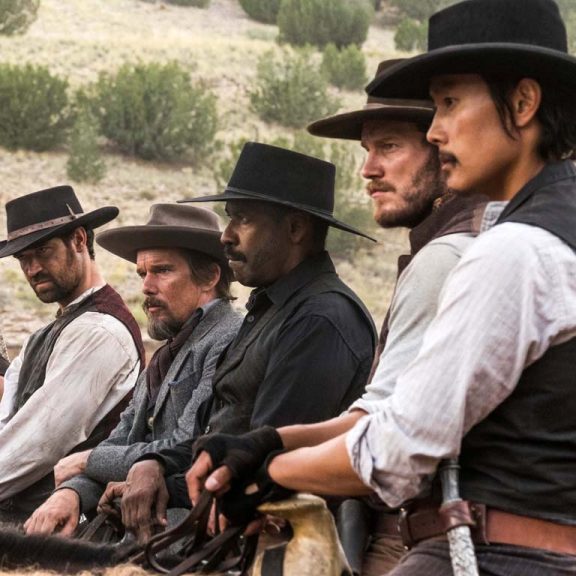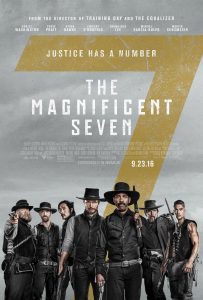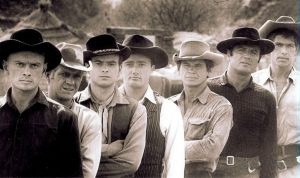Directed by Antoine Fuqua | Written by Richard Wenk and Nic Pizzolato, based on the screenplays for The Magnificent Seven (1960) by William Roberts and The Seven Samurai (1954) by Akira Kurosawa, Shinobu Hashimoto, and Hideo Oguni | 133 min
A remake of a remake of a remake, this newest tale of hired guns helping out a village terrorized by a bad guy and his army seems pretty damn calculated—another money grab playing on nostalgia and brand recognition. A pleasant surprise, then, that the resulting movie, while being uneven, manages to deliver a solid slab of genre entertainment.
A preparatory rewatch of John Sturges 1960 western (at 128 minutes, feels longer than the 2016 version) makes clear two things: 1) The film is a blueprint for boomer masculinity: strong but silent American men do the noble thing in a team, even if there’s no money in it. And 2), The life of a hired gun means you forsake the chance at lasting happiness. “Only the farmers won,” says Yul Brynner at the end. “We lost. We always lose.”
The first lesson has been absorbed into the bedrock of the new film—along with the casual sexism that you’d hope would have been left behind. Some cliches of a genre are cool, and some are definitely not. Also, the heart of the earlier film, that these gunfighters are alone in the world and have nothing to lose, is sadly amiss here. Also, the Horst Buchholz character, the prideful youth, is largely forgotten and so are his lessons.
However, the picture still works in lots of ways. The seven outlaws, led by Denzel Washington and including Chris Pratt, Ethan Hawke, Byung-hun Lee, Vincent D’Onofrio, Martin Sensmeier, and Manuel Garcia-Rulfo, all deliver with distinction, though the movie doesn’t give much attention to the motivation of the latter three. Back in 1960, the seven were offered next to no money to do the job—that’s how you knew their motivations were pure. Here, it’s a little harder to tell.
I do like Hawke, who has matured into a terrific actor. His Goodnight Robichaud is a mix of the Robert Vaughan and Brad Dexter characters from the older movie with an added PTSD subplot that isn’t resolved at all, but his presence is enough to elevate the material. Pratt continues to show a comedic ease in front of the camera, though not much else, while Peter Sarsgaard channels a Malkovich-esque menace as the bad guy. And Denzel is Denzel.
What Fuqua gets really right is the denouement. The set-up is a bit sloppy, but the final blow-out is satisfying, and forgives a lot of the earlier sins, even though it’s much less the suicide mission as set up in the earlier film. After mostly ignoring her, Fuqua manages to give Haley Bennett, in the lead female role, a good moment.
There’s no way this erases the memory of the film that made Steve McQueen a star, but it’s fresh enough to justify its existence, something a lot of remakes can’t claim.









